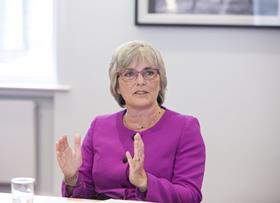Community staff are still working with old, inefficient systems, a leading nursing expert tells Alison Moore
Community nurses are at the interface between health and social care, often caring for patients who are also receiving social care. Shared information could help them see a more holistic picture of the patient and their needs, and contribute to finely-balanced decisions such as whether remaining at home is the right thing for a patient.
Still waiting for the digital age

But despite this pivotal role, community nurses often don’t have good access to information – whether held by partners such as social services or by their own organisation.
Many nurses had not even been issued with a phone by their employers – despite often working alone
QNI chief executive Crystal Oldman said a survey of 500 members had shown that 27 per cent were still paper-based and some had not even been issued with a phone by their employers – despite often working alone. Many used systems that were old and clunky and had not been designed with clinical input.
The QNI had done a similar survey five years ago but what was different about the current one was that there was no money to put things right, she added.
Roundtable: Data can drive improvements in healthcare – how can we share it more effectively?

In a joint HSJ/LGC roundtable, our expert panel discussed the problems of a health service in need of more patient data but constrained by privacy issues, public mistrust and official reticence, as well as all-too-familiar financial and technological obstacles. Alison Moore sat in.
- 1
- 2
 Currently
reading
Currently
reading
Roundtable: Why community nurses suffer from lack of shared data































No comments yet